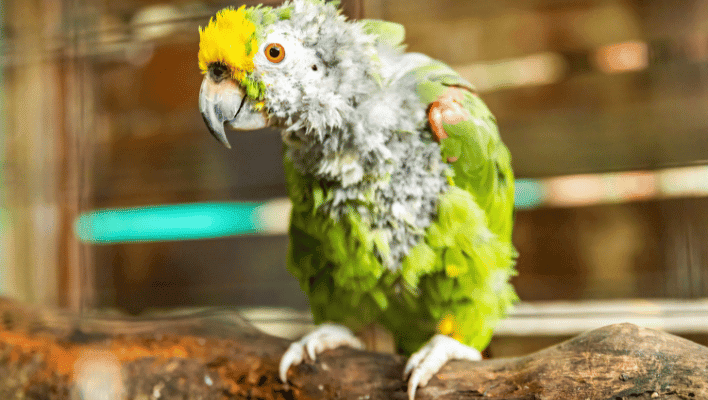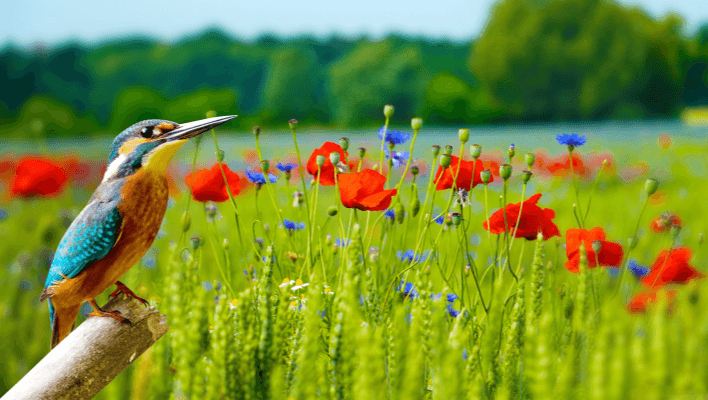Table of Contents
Introduction
With their colourful feathers and enchanting sounds, birds have long caught people’s attention. But much like us, our avian friends can endure the stress that compromises their physical and emotional health. We will examine a variety of methods for reducing stress in birds in this thorough guide, including the use of homoeopathy, viewpoints from professionals, and holistic treatment techniques. Explore avian stress and learn how to create a peaceful and healthy habitat for our bird friends.

Understanding the Struggle of Stress in Birds
Bird owners and hobbyists share a common worry about avian stress. Numerous things, including changes in their habitat, a lack of social interaction, and interruptions to their regular routines, can cause stress in birds. Stress might show itself as habits like as picking up feathers, shouting too much, or even physical problems. For birds to be healthy generally, it is essential to recognize the symptoms of stress.
A Natural Approach to Reduce Stress in Birds: Homeopathy
An increasingly popular holistic therapeutic approach called homoeopathy has been shown to be successful in reducing avian stress. Homoeopathy strives to bring the body and mind back into equilibrium by employing natural treatments made from plants and minerals. Bird owners can address specific stress-related symptoms and encourage emotional balance by using Synthesis 9.0 Repertory, a thorough aid for choosing appropriate homoeopathic medications.
Avian Mental Health: Considerations and Insights
Dr. Hahnemann’s homoeopathic discoveries are applied to the treatment of birds, highlighting the connection between mental and physical health. The concept of holistic avian care recognizes the significance of mental health for a bird’s overall health. It’s important to ensure a healthy diet, enough mental stimulation, and opportunities for social connection in order to foster a stress-free atmosphere.
Stress’s Effects on Bird Health: A Wide-Angle View
Avian health can be negatively impacted by stress, which can result in weakened immune systems, increased susceptibility to infections, and shorter lifespans. Long-term effects of chronic avian stress can include harm to both bodily and psychological well-being. Understanding this effect emphasizes how urgent it is to put stress-reduction techniques in place.
Chronic Stress in Birds: A Hidden Threat
Chronic stress can slowly deteriorate a bird’s well-being, resulting in ongoing health problems and decreased vigour. Homoeopathy can be used to care for birds, offering gentle yet effective support for those who are under constant stress. Homoeopathic treatments can aid in restoring balance and encouraging long-term wellness by treating the root causes of stress.
Practical Advice for Making a Stress-Free Environment for Birds
It’s essential to create a stress-free atmosphere to support avian mental health. Stress levels can be greatly reduced by establishing a cosy and exciting living environment, providing regular opportunities for exercise, and including mentally stimulating hobbies. Assuring healthy food and upholding a regular daily schedule can also improve a bird’s general well-being.
Homoeopathic Treatments for Stress in Birds: Natural Stress Reduction in Birds
Homoeopathic treatments formulated for each bird’s unique requirements can be crucial in reducing stress-related problems. These all-natural medicines are carefully chosen depending on each patient’s symptoms and characteristics. Homeopathy offers a specialized and all-encompassing approach to stress treatment, from Chamomilla for agitated birds to Ignatia for individuals grieving loss.
Stress Resilience in Birds: Promoting Mental Health
Fostering resiliency and emotional balance are key components of bird mental health care. A bird’s ability to cope with stress can be increased by using positive reinforcement strategies, developing relationships based on trust, and offering opportunities for social contact. Owners of birds can better equip their companions to deal with pressures by concentrating on these factors.
Bird Stress Triggers: Recognizing and Reducing
Effective stress management requires an understanding of avian stress causes. Changes in habit, being in strange places, and being exposed to loud noises are common triggers. Owners of birds can take proactive steps to lessen these stresses’ effects by identifying them and thereby fostering a more stable and peaceful habitat.
A Progressive Approach to the Development of New Concepts in
Leading perspectives in the field of avian mental health emphasize holistic methods as it continues to develop. These techniques, which draw on psychology, behaviourism, and holistic medicine, seek to tackle avian stress from a variety of perspectives. We can find creative ways to encourage avian mental wellness by adopting fresh viewpoints.
Avian Mental Wellness Promotion: A Comprehensive Approach
A multifaceted strategy that takes into account physical, emotional, and social needs is necessary to promote the mental wellness of birds. Crucial elements include offering entertaining toys, creating many flying possibilities, and guaranteeing consistent cerebral stimulation. Furthermore, a loving and compassionate relationship between a bird and its owner can make a big difference in the bird’s mental health.
A Balanced Perspective on the Importance of Holistic Approaches for Avian Wellness
The interdependence of physical, mental, and emotional health is a key component of holistic approaches to avian wellness. Bird owners may improve the entire quality of life for their pets by addressing stressors on all fronts, including emotional and environmental. The importance of considering birds as sentient animals with complex needs is highlighted by the holistic approach.
Stress and Avian Physical Health: The Mind-Body Connection
The relationship between the mind and body is crucial to the well-being of birds. Birds with weakened immune systems are more susceptible to infections and diseases due to chronic stress. On the other hand, putting avian physical health first helps to lower overall stress. Avian physical well-being requires regular veterinary examinations, a balanced diet, and good hygiene.
A Closer Look at Chronic Stress and Its Impacts on Bird Partners
Avian companions may experience physical discomfort and behavioural changes as a result of chronic stress. These side effects could include a general decline in quality of life as well as a decrease in appetite and vocalization. Understanding the subtle effects of chronic stress emphasizes the significance of early intervention and comprehensive care.
Animal Welfare A Holistic Approach to Holistic Care
A thorough and sympathetic approach to avian well-being is holistic care. Owners of birds can establish an atmosphere that encourages peace and vitality by taking into account physical, psychological, and emotional factors. A detailed awareness of each bird’s particular requirements is necessary to properly care for the well-being of the birds.
A Step Towards Balance: Reducing Stress-Induced Disturbances in Birds
Promoting the balance and harmony of birds requires first addressing disturbances brought on by stress. Every effort makes a difference to a bird’s health, whether it is through homoeopathic treatments, habitat modifications, or encouraging social relationships. Owners of birds are essential in ensuring the happiness of their companions because they acknowledge and actively deal with stressors.
Stress in Birds Health: Expert Perspectives and Practitioner Advice
bird care specialists provide insightful advice on promoting bird mental health. These professionals emphasize the value of holistic approaches, personalised care, and ongoing learning thanks to years of experience and study in the field. Owners of birds looking to improve the mental health of their companions can learn from their wisdom.
Conclusion
The treatment of stress is a critical thread in the intricate fabric of avian well-being. We have investigated a variety of approaches for reducing stress in birds, from knowing the indicators of stress to embracing holistic care techniques and using the insights of professionals. We can foster a peaceful environment where our avian friends thrive by putting the greatest emphasis on their physical and mental well-being. Remember that supporting the mental health and well-being of birds is both a responsibility and a privilege, one that improves both their lives and our own.

